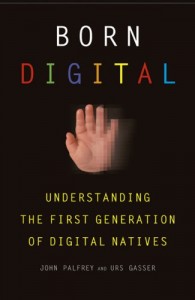 This book was a very easy read about a subject that is not intuitive to me being a digital immigrant. I appreciate that the book has chosen a broad audience to address that includes parents, educators, and librarians— to create a conversation between all those who have high stakes in dealing with the changing needs of the digital native population. The idea of creating a dialogue between parents and their children, educators and their students, librarians and their users, was a strong point throughout the book and reiterated in the synthesis, “…this book is an invitation to conversation. It’s an invitation sent out especially to parents and teachers of DigitalNatives and would-be Digital Natives” (274).
This book was a very easy read about a subject that is not intuitive to me being a digital immigrant. I appreciate that the book has chosen a broad audience to address that includes parents, educators, and librarians— to create a conversation between all those who have high stakes in dealing with the changing needs of the digital native population. The idea of creating a dialogue between parents and their children, educators and their students, librarians and their users, was a strong point throughout the book and reiterated in the synthesis, “…this book is an invitation to conversation. It’s an invitation sent out especially to parents and teachers of DigitalNatives and would-be Digital Natives” (274).
I think libraries would make an excellent place to “…make space for students, parents, and teachers to educate one another about what’s going on in cyberspace and to explore together ways to mitigate the risks that online life brings with it” (102). The book highlights many of the same topics as this course, which compliments my feeling this week that “the virtual world complements and extends the offline social sphere” (25).
- The world is becoming more interconnected, and more interrelated. Library space is changing since cyberspace can, and often is, accessed there. This means there needs to be information on topics that include cyberbullying, privacy, online safety, intellectual property rights, accessing quality information versus the quantity of information that can be found on the Internet and how to battle information overload. “Digital literacy is increasingly a critical skill for Digital Natives to learn. We are not yet doing what we can, or even what we need to do, to teach Digital Natives to be media literate in this new, more complex information environment” (181).
- The way Digital Natives are interacting with information is changing rapidly. Librarians need to stay educated—be aware of the technology so the conversations/education seminars are relevant to Digital Natives. “This participatory digital environment requires all of us to become more media literate” (128). “We ignore the social norms of DigitalNatives at our peril” (148). “Those who come to understand the dynamics of information production in the digital era will be better prepared than anyone else to thrive in the integrated digital world. And the best way to learn these dynamics is to participate in information production directly” (159).
- Use older Digital Natives to stay informed and current on how to engage Digital Natives—to create a community-based solution to the complex and continually evolving issues created by new information and technologies. “Tap into—and celebrate—the creativity of the DigitalNatives to help solve the problem” (105). “And it is Digital Natives who are best poised to engage in this process” (125).
- Digital Natives are creative—the library must also be creative in ways to educate and engage them. “What stands out to us is…the extent to which this creativity represent an opportunity for learning, personal expression, individual autonomy, and political change” (113). AllowDigital Natives to “control the shaping of culture, the making of ‘meaning’” for the way they use the library (125). “Digital Natives presuppose their role as shapers of culture…information diversity, with greater participation by young people, is a positive development that we believe will be good for the long-term health of our society” (126). Allow them to navigate and interface with the library using their mental maps—and new ways of how libraries can be relevant to them could be developed—and ultimately they could create new terrain within society through this exploration and application of their critical thinking skills. “The way that many young people are using information technologies is changing the way the world works. We don’t yet know the full impact of these changes, but we know that they are profound and will alter all manner of dynamics over the coming decades, if not centuries and beyond” (287).
Palfrey, John and Urs Gasser. Born Digital: Understanding the First Generation of Digital Natives. New York: Basic Books, 2008.
Lindsay Peifer is currently an English teacher in St. Paul, Minnesota, and a library science student at the College of St. Catherine.
